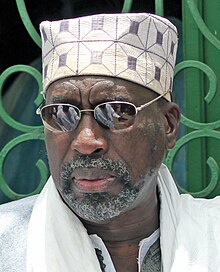Lebou
The Lébou are an ethnic group in Senegal . Their traditional language is a special Wolof dialect .
At the time of the arrival of the first Europeans around 1500, the Lébou had just left the Wolof settlement area and settled the Cap-Vert peninsula . Upon arrival, they found the area of Mandinka populated, with which they lived peacefully for about 50 years before arguments broke out and these long-established residents were pushed south.
In the historical core, the districts of Yoff , Ngor and Ouakam emerged from fishing villages founded by the Lébou. And in the area of today's city center of Dakar, in the districts of Dakar Plateau and Médina , the immigrants founded twelve villages, each grouped around prominent trees as the village center.
When France established its colonial rule over French West Africa and founded the rapidly growing city of Dakar , the Lébou were eventually ousted from six of their villages in the city center. A plague epidemic somewhere in the country in 1914 provided the occasion for a planned relocation to protect the European settlers . At that time, the Médina district was built as an urban center for the local population, which had to maintain a building-free safety distance from the French-dominated Dakar.
Even if the Lébou have adopted Islam almost without exception, they still practice a number of traditional rites and worship a place of worship on the Îles de la Madeleine off the west coast . The Lébou form a traditional community (communauté) whose head has been called the Grand Serigne de Dakar since 1795 . Since 2013 this position has been held by Abdoulaye Makhtar Diop .
Individual evidence
- ↑ Monica Kalla Lobé, November 21, 2017: La culture lébou sous le projecteur
- ↑ Les Lébous de Dakar ont un nouveau Grand Serigne. Au Senegal from May 20, 2013 PDF file 0.14 MB with a list of the holders of the title
